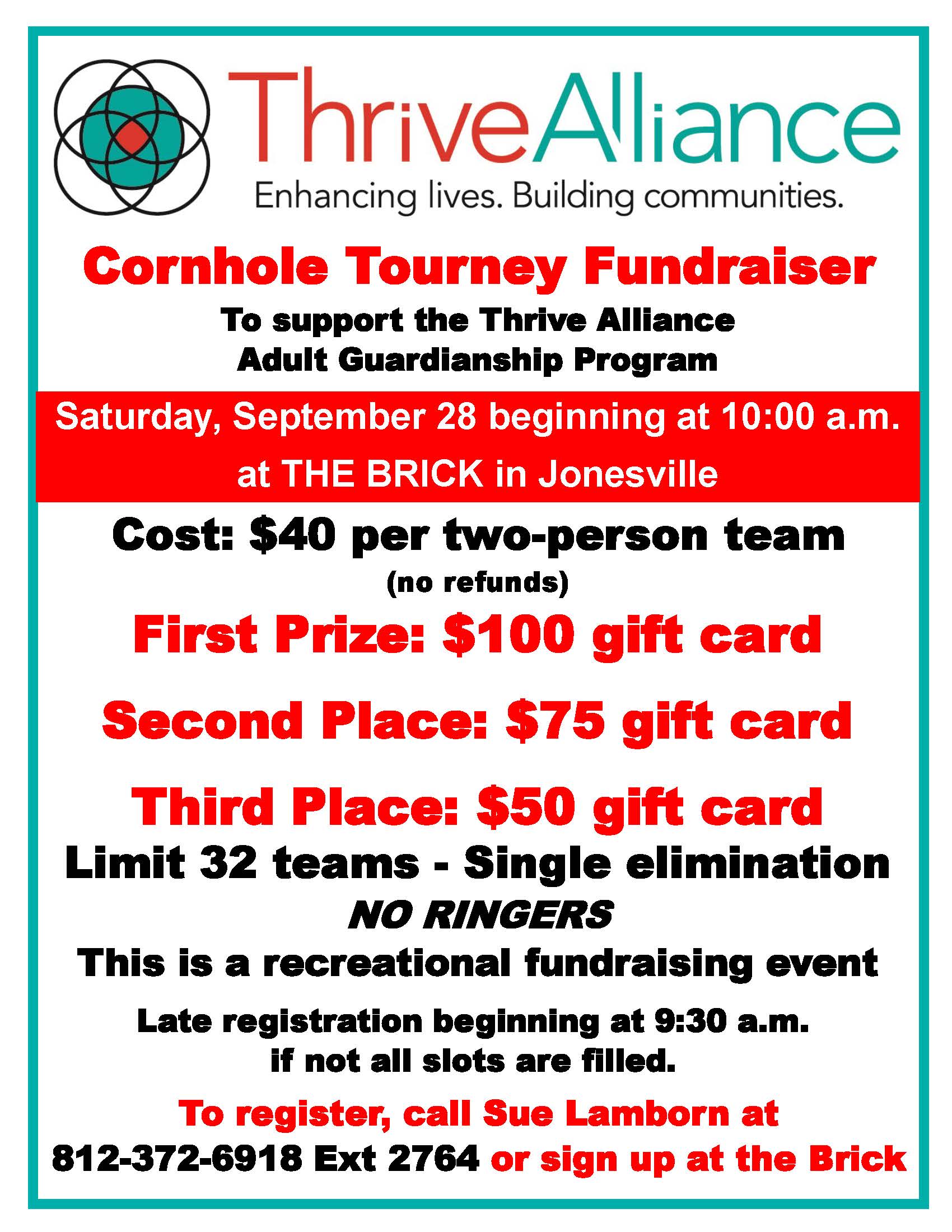
Sign Up for our Cornhole Tourney Fundraiser at The Brick!

Free caregiver support classes being offered in Seymour by Thrive Alliance
Feeling Stretched as a Caregiver? Powerful Tools for Caregivers is an educational series designed to provide caregivers with the tools they need to take care of those in their care while also taking care of themselves. The program is offered free of charge.
This program helps family caregivers reduce stress, improve self-confidence, better communicate feelings, balance their lives, increase their ability to make tough decisions, and locate helpful resources.
Classes consist of six sessions held once a week. Interactive lessons, discussions and brainstorming help caregivers take the “tools” they choose and put them into action. Participants receive a copy of The Caregiver Helpbook, developed specifically for the class.
Classes will be held every Thursday from 4:30 p.m. to 6:00 p.m., July 25 through August 29, in the Community Room of Crossroads Senior Apartments, 500 South Poplar Street in Seymour.
For more information or to register, contact 812.372.6918 ext. 2403 by July 22.
From The Republic: City moves Haw Creek Meadows project forward
City moves Haw Creek Meadows project forward
City officials approved declaring the location of a potential affordable housing development an economic revitalization area (ERA).
The Columbus City Council voted 7-0 Tuesday to pass the request, the first step towards qualifying for a tax abatement.
Council member Chris Bartels, R-District 1 was absent. Council member Grace Kestler, D-at-large, abstained from the vote because she’s on the Thrive Alliance board.
Housing Partnerships Inc. (HPI), a non-profit that does business as Thrive Alliance, is planning a development called Haw Creek Meadows that would be a combination of workforce family housing and housing for seniors to be built over two phases.
It would be located at the site of the former Columbus Health and Rehabilitation Center at 2100 Midway St. and reserved for those making 30%, 50% and 60% of area median income (AMI), Thrive Alliance officials said.
Next, the council will vote on a confirmatory resolution to make the area an ERA during their meeting on July 16 to officially qualify HPI for a tax abatement.
Phase one would see 64 workforce family housing units with a child care component and phase two would encompass 64 units for seniors.
The child care facility would be open to both residents and non-residents and focused on children up to age 3, Kevin Johnson, executive director of Housing Partnerships at Thrive Alliance, told the redevelopment commission last week. He said they plan to have an agreement in place with a licensed childcare provider who will work in the facility.
The multifamily portion will consist of 20, 30 percent AMI units, 13, 50 percent AMI units and 31, 60 percent AMI units, Johnson said on Tuesday night.
Plans for the development also include a quarter-mile walking trail, a picnic area, a gazebo and a community garden. Johnson added they would also look to add a commercial space for something like a coffee shop “so the seniors would have a reason to come out of their units and break down social isolation.”
The project will likely be up for bids in the second quarter of next year and construction will start by the third quarter, according to Johnson. Build time is expected to take 15 to 18 months with leasing getting started in 2026 and reaching 100 percent occupancy in June of 2027.
Haw Creek Meadows would require demolition of the existing property on site and the construction of a new four-story building — the total project cost for phase one is expected to be $20.6 million, Andrew Lanam of Stifel Public Finance told the redevelopment commission last week.
HPI intends to ask for a 10-year real property tax abatement on a $14.4 million investment, according to city documents. The tax abatement itself would also be voted on during the July 16 meeting.
HPI is applying for an award of 9 percent federal low-income housing tax (LIHT) credits in the amount of $13 million to help with financing of the project, along with about $3.3 million in Regional Economic Acceleration & Development Initiative (READI) funds through the South Central Indiana Housing and Community Development Corporation (SCIHCDC).
The application for LIHT credits will be submitted by the end of this month and are awarded in November, Johnson said on Tuesday night.
Happy Independence Day!

Many thanks to Voelz, Reed and Mount for their support of our mission!

From The Republic: Council to consider creating an economic revitalization area for affordable housing project
 Mike Wolanin | The Republic An exterior view of Columbus Transitional Care and Rehabilitation, 2100 Midway St., in Columbus, Ind., Thursday, April 2, 2020.
Mike Wolanin | The Republic An exterior view of Columbus Transitional Care and Rehabilitation, 2100 Midway St., in Columbus, Ind., Thursday, April 2, 2020.
The Columbus City Council will consider tonight declaring the location of a potential affordable housing development an economic revitalization area (ERA), the first step towards qualifying for a tax abatement.
Housing Partnerships Inc. (HPI), a non-profit that does business as Thrive Alliance, is planning a development called Haw Creek Meadows that would be a combination of workforce family housing and housing for seniors to be built over two phases.
It would be located at the site of the former Columbus Health and Rehabilitation Center at 2100 Midway St. and reserved for those making 30, 50 and 60 percent of area median income (AMI), Thrive Alliance officials have said.
The council will be voting on a declaratory resolution to establish the area as an ERA and if approved, the council would then have to pass a confirmatory resolution on the matter during their meeting on July 16 to officially qualify HPI for a tax abatement.
The project will likely be up for bids in the second quarter of next year and construction will start by the third quarter, Kevin Johnson, executive director of Housing Partnerships at Thrive Alliance, has said. Build time is expected to take 15 to 18 months with leasing getting started in 2026.
Haw Creek Meadows would require demolition of the existing property on site and the construction of a new four-story building — the total project cost for phase one is expected to be $20.6 million, Andrew Lanam of Stifel Public Finance told the redevelopment commission last week.
Phase one would see 64 workforce family housing units with a child care component and phase two would encompass 64 units for seniors.
The child care facility would be open to both residents and non-residents and focused on children up to age 3, Johnson told the redevelopment commission. He added they plan to have an agreement in place with a licensed childcare provider who will work in the facility.
HPI intends to ask for a 10-year real property tax abatement on a $14.4 million investment, according to city documents. The tax abatement itself would also be voted on during the July 16 meeting.
In a letter directed to Director of Community Development Robin Hilber, Johnson said the 64-unit building would result in 1.5 full-time equivalent positions by the end of 2026 at an average wage of $24.61, plus the creation of an estimated 100 temporary construction jobs.
HPI is applying for an award of 9 percent federal low-income housing tax (LIHT) credits in the amount of $13 million to help with financing of the project, along with about $3.3 million in Regional Economic Acceleration & Development Initiative (READI) funds through the South Central Indiana Housing and Community Development Corporation (SCIHCDC).
The Columbus Redevelopment Commission on June 24 voted to contribute to the project an amount not to exceed $4.65 million from the city’s central tax increment financing (TIF) district. However, how much TIF funds the redevelopment commission will actually end up contributing will depend on the amount of READI funds awarded, and will be reduced dollar for dollar on an award greater than $2 million. Because of this, the TIF dollars wouldn’t realistically go out until calendar year 2025, Lanam said last week.
The city council will have to sign off on the redevelopment commission’s contribution because it is an expenditure greater than $500,000. That will be on the July 16 agenda as well, Director of Redevelopment Heather Pope said.
July Caregiver Connection
The July edition of Caregiver Connection is at this LINK.
Sign Up for our Cornhole Tourney Fundraiser!

Farmers Market producers, sign up to help fight food insecurity.

Thrive Alliance Housing Partnerships receives Certified Organization for Resident Engagement and Services (CORES) accreditation
Thrive Alliance Housing Partnerships recently received full accreditation as a Certified Organization for Resident
Engagement and Services (CORES).
The CORES Certification recognizes organizations with a proven track record of providing quality resident services coordination in affordable rental housing. Achieving CORES Certification signals an organization’s commitment to the highest standards for resident services, a deep commitment to resident health and well-being, and data-informed operations and decision making.
“We are extremely pleased to receive this important level of certification,” said Kevin Johnson, Executive Director of Thrive Alliance Housing Partnerships. “It is an indicator that we are successfully achieving our goals of offering safe, affordable housing to our residents while also providing the needed support to ensure they can live secure, healthy, and fulfilling lives.”
Johnson credits Thrive Alliance Resident Services Coordinator, Ethan Ault, and Rental Property Manager, Chad Malanoski, for their efforts in completing the very detailed certification process and ensuring Thrive Alliance’s housing programs and services are operating in coordination to meet the CORES certification requirements.
Teresa Lorenz, Thrive Alliance Executive Director, stated, “CORES certification will help the organization continue its mission of incorporating our expertise in social services and care management into our housing programs and services. It is also a sign of the dedication and commitment of all our staff in providing the highest quality service to those who are in our care.”

